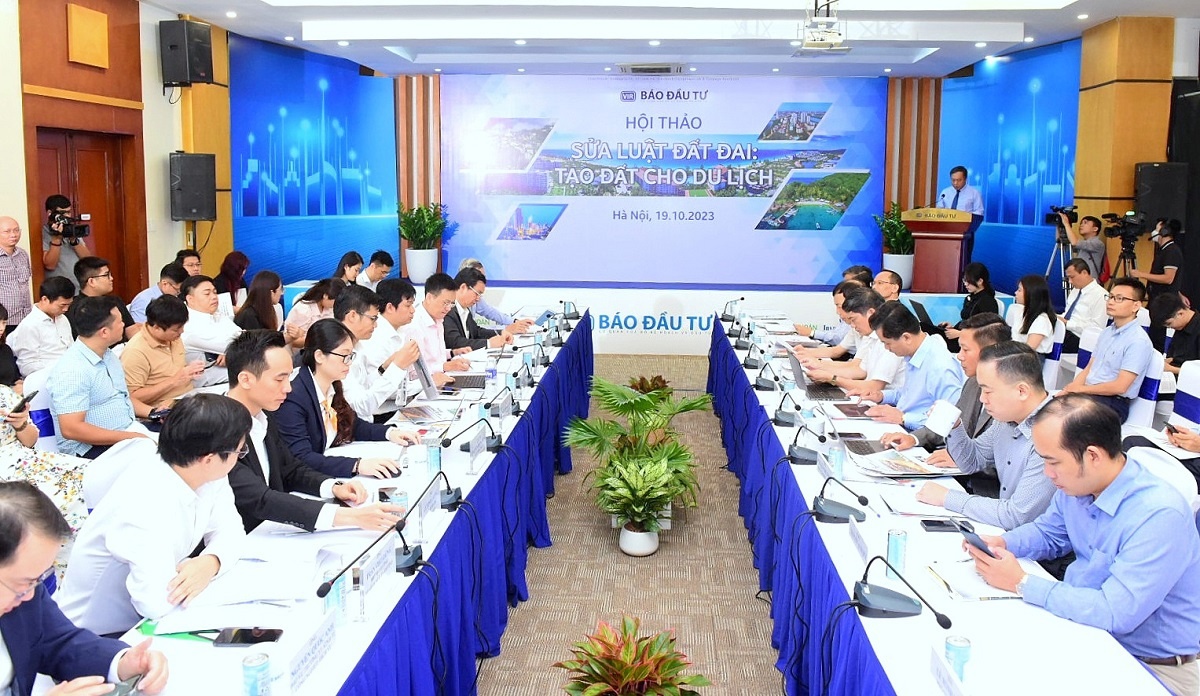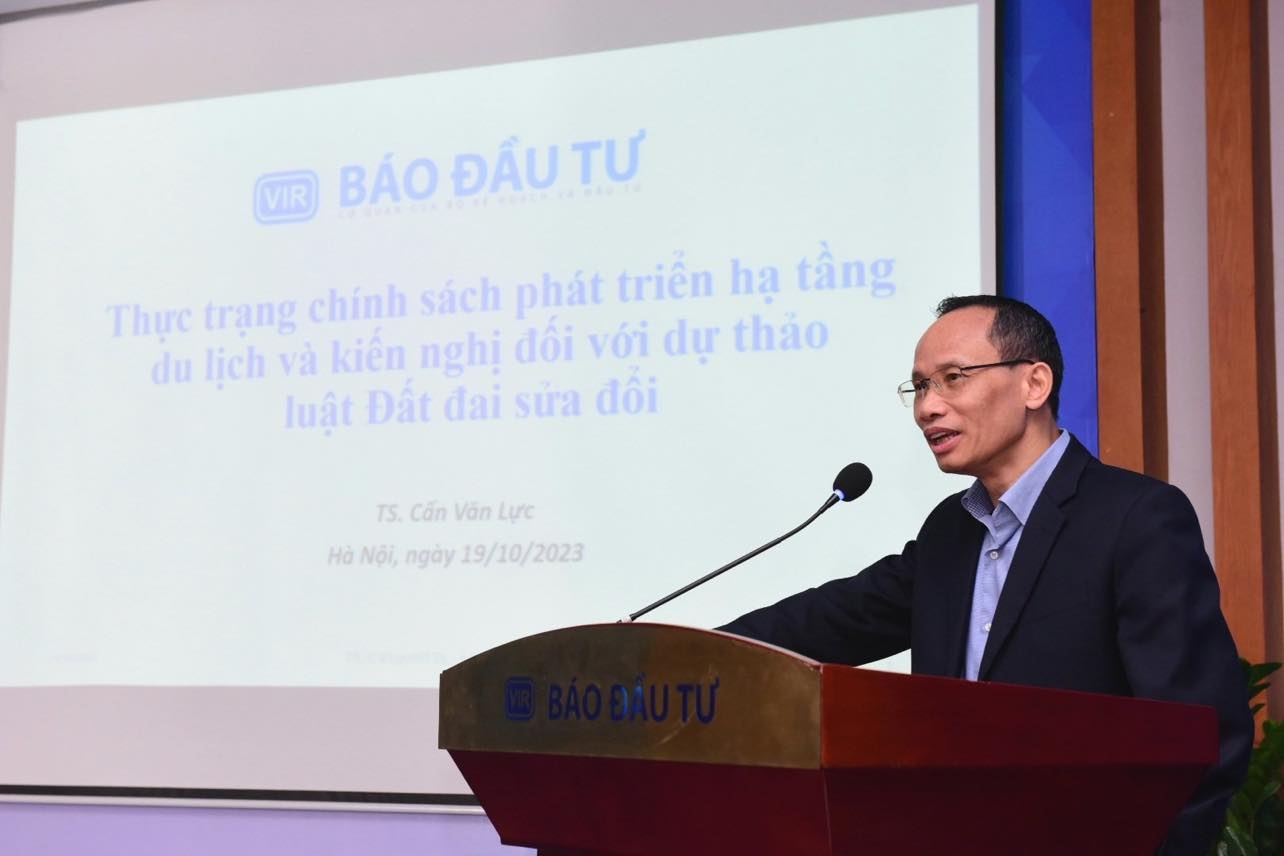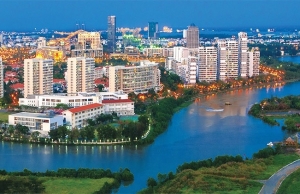VIR seminar addresses Land Law amendments
 |
On October 19, VIR hosted a seminar themed "Revising the Land Law: Creating Land Funds for Tourism." The seminar saw various speakers offering insights, analyses, and recommendations pertaining to policies aimed at enabling investors to access land, develop tourism infrastructure, services, and promote economic growth within the amended Land Law framework.
According to data presented by the Vietnam Real Estate Association (VREA), there are currently around 239 tourism and resort real estate projects across the country.
Among these, condotel projects are estimated at $12.52 billion, villa projects at roughly $10.28 billion, and shophouse projects at about $6.5 billion. The cumulative value of these three property categories stands at around $30 billion.
However, this sector has faced a considerable deceleration in recent years following a period of rapid expansion. The market has essentially stagnated, and transaction volumes have dwindled significantly.
The chief factors contributing to this pronounced market downturn, besides the lingering impact of pandemic, include the absence of a comprehensive development strategy for the tourism sector. Of particular concern is the lack of a well-defined legal framework governing the efficient utilisation of land resources and the essential infrastructure required for tourism development in Vietnam.
A survey conducted by the Vietnam Real Estate Research Institute highlights the factors inhibiting the pace, scale, and commitment of participation in the tourism and resort real estate market in Vietnam.
“Economic and financial factors account for 30 per cent, legal considerations for half, and other elements for 20 per cent. These figures underscore the legal gaps in the sphere of tourism and resort real estate operations, causing apprehension among investors regarding legal security and potential risks,” the survey said.
In stark contrast, both the Tourism Development Strategy for Vietnam up to 2020, approved in Decision No. 2473/QD-TTg, and the Comprehensive Tourism Development Plan for Vietnam up to 2020, approved in Decision No. 201/QD-TTg, unequivocally assert that tourism is slated to evolve into a pivotal economic sector with an escalating share in the GDP structure.
 |
According to economist Can Van Luc, Resolution No.08/TW of the Vietnam Communist Party regarding the elevation of tourism into a spearhead economic sector explicitly underscores a pivotal task and solution: to elevate tourism into a spearhead economic sector, and by the year 2030, draw in 47-50 million international tourists to Vietnam, contributing approximately 14-15 per cent to the GDP.
"Vietnam stands at a moderately competitive level when it comes to tourism infrastructure, encompassing aspects like restaurants, hotels, resorts, and economic security," Luc said
However, to attain its ambitions of joining the top 30 global tourist destinations, a pivotal elevation in tourism infrastructure is imperative.
"In the post-Covid-19 era, tourists are especially concerned about their experiences related to accommodation and transportation," Luc said.
Despite significant growth, Vietnam's lodging infrastructure has been progressing at a relatively leisurely pace. As of the close of 2022, the total number of tourism accommodation facilities stood at 35,000, reflecting a 16.7 per cent increase compared to 2019. Furthermore, the aggregate room count reached 700,000 rooms in 2022, marking a 7.7 per cent upturn from the end of 2019.
The majority of these accommodation facilities are either of a 3-star rating or remain unclassified. Shockingly, a staggering 82.7 per cent of these establishments at the close of 2022 held a 3-star rating or remained unclassified, signifying that they fell short of the rating standards.
Premium-grade accommodations constituted a comparatively smaller fraction, with 5-star rated establishments accounting for 10.7 per cent and 4-star rated entities representing 6.6 per cent.
The discernible challenge that Vietnam faces is not only the quantitative expansion of its hospitality offerings but also the qualitative upliftment of these facilities. This issue becomes more pertinent as the country seeks to draw in a more diverse range of tourists, each with unique preferences and requirements. In response, there is a compelling demand for increased investment and renovation in tourism accommodation and services.
“One of the major roadblocks is the lack of a specific and detailed policy framework supporting the tourism industry,” Luc said.
He also emphasised the need for clear incentives for the sector, which are currently lacking in key laws and regulations like the 2020 Law on Investment and the 2020 Public-Private Partnership Law.
Moreover, the absence of a competitive land allocation process for tourism projects is a noteworthy concern. Vietnam's current regulations don't allow tourism businesses to acquire land through competitive bidding for land-use rights, a situation outlined Decree No. 25/2020/ND-CP, in February 2020.
“Furthermore, there is an aspiration for Vietnam to carve its niche as a sustainable and high-quality tourism destination, with a focus on offering memorable experiences to travellers. To attain these goals, the elevation of tourism infrastructure is unequivocally necessary,” Luc added.
Dr. Do Thanh Trung, advisor to Phuc Khang Corporation's Board of Directors, underscored the pivotal role of land legislation within Vietnam's legal framework.
“This legislation has far-reaching implications for various stakeholders, from the government and businesses to citizens, significantly influencing socioeconomic development, particularly in the tourism sector,” Trung said. "Vietnam possesses substantial potential for tourism development. However, the existing infrastructure may not be commensurate with this potential. There's an urgent need to create better conditions for the growth of tourism-related real estate projects. After all, a competitive advantage alone, without a developmental platform, might be challenging."
Furthermore, he highlighted the necessity for an appropriate policy framework that facilitates land allocation for tourism development and the essential conditions required to include tourism lands within the 30 cases in which the state can requisition land for economic development.
 | Amended land law can remove current limitations The Law on Land is an essential law, institutionalising the major guidelines of regulation on continuing to innovate and complete institutions and policies, and improve the effectiveness and efficiency of management and use of land, creating a driving force to help Vietnam become a high-income developed country. |
 | Land rules widened to aid tourism Experts are recommending it is necessary to add types of mix-use housing projects, new urban areas combined with commercial businesses, tourism, entertainment and multipurpose complexes into a revised draft Land Law regulating government land repossession for development. |
What the stars mean:
★ Poor ★ ★ Promising ★★★ Good ★★★★ Very good ★★★★★ Exceptional
 Tag:
Tag:
Related Contents
Latest News
More News
- Saigon Centre gains LEED platinum and gold certifications (February 12, 2026 | 16:37)
- Construction firms poised for growth on public investment and capital market support (February 11, 2026 | 11:38)
- Mitsubishi acquires Thuan An 1 residential development from PDR (February 09, 2026 | 08:00)
- Frasers Property and GELEX Infrastructure propose new joint venture (February 07, 2026 | 15:00)
- Sun Group led consortium selected as investor for new urban area (February 06, 2026 | 15:20)
- Vietnam breaks into Top 10 countries and regions for LEED outside the US (February 05, 2026 | 17:56)
- Fairmont opens first Vietnam property in Hanoi (February 04, 2026 | 16:09)
- Real estate investment trusts pivotal for long-term success (February 02, 2026 | 11:09)
- Dong Nai experiences shifting expectations and new industrial cycle (January 28, 2026 | 09:00)
- An Phat 5 Industrial Park targets ESG-driven investors in Hai Phong (January 26, 2026 | 08:30)























 Mobile Version
Mobile Version